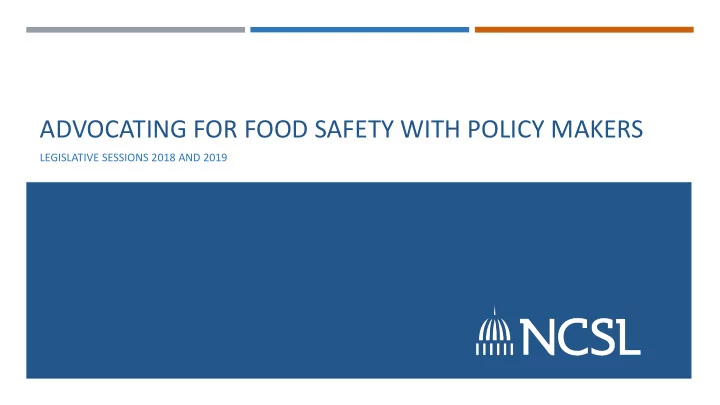

ADVOCATING FOR FOOD SAFETY WITH POLICY MAKERS LEGISLATIVE SESSIONS 2018 AND 2019
NCSL OUTREACH TO STATE LEGISLATURES 6,211 Attendees to NCSL Boston Legislative Summit 1,203 State Legislators 1,111 Legislative Staff 13,003,731 Visits to NCSL Website 67 Webinars 49 Trainings or Testimony before Legislative Committees 10 issues of State Legislatures Magazine 335,000 visits to Social Media
WYOMING FOOD FREEDOM LAWS “This act ( Chapters 56 & 111) is a home-run. Wyoming's local food options have exploded and we still have had 0 foodborne illness outbreaks due to this Act passing into law.“ Wyoming Rep. Tyler Lindholm
STATE LEGISLATURES 2019 Current Composition Republicans Democrats Other 107 (Independent, Other or Legislators (7,383 total) 3,830 / 52% 3,446 / 47% Undecided) Chambers (98 total) 61 / 62% 37 / 38% Nebraska Unicameral Legislatures (49 total) 30 / 61% 18 / 37% 1 divided legislature State Control (49 total) 22 / 45% 14 / 29% 13 divided states
FOOD SAFETY LEGISLATION IN 2018 756 bills relating to Food Safety; 170 enacted Foremost Issues Food Donation – 72 bills Food Service in Schools – 57 bills Restaurants – 57 bills Milk or Raw Milk – 45 bills Cottage Foods – 48 bills GMO – 18 bills
STATE LEGISLATURES’ PROFESSIONALIZATION EFFECTS Greater capacity Ability to make decisions independent of executive, lobbyists Stable membership Allows for more voices, more interests represented Decentralization and fragmentation Avoids Policy gridlock
STATE LEGISLATURES’ “ DEPROFESSIONALIZING ” FORCES Term limits Limits on taxing and spending authority Staff reductions Ethics/campaign finance laws that prevent openess Anti-government attitudes Decline of trust of government
NON-PARTISAN FORCES OF EFFICACY State constitutions and rules such as single subject requirements for bills, limited sessions with effective deadlines, requirements for balanced budgets, and the fair and consistent application of rules. Governors and legislative leaders who are able to see the big picture, communicate and work together effectively, and make efforts to treat the minority party fairly and value their input. Empowered committees that deliberate effectively and make efforts to incorporate minority party ideas. Personal relations, cultures and traditions among legislators that promote interparty communication and engender trust and respect. Nonpartisan staff. A determination/requirements to get things done, unlike Congress.
CONSTRAINTS ON INTERACTIONS WITH STATE LEGISLATURES • Not allowed to initiate contact with legislators • Communication via legislative liaison – no direct interaction • Legislators who reach out directly do not receive calls back • Direct communication is monitored or must be documented • Have to constrain information to that which is within the context of the food safety agencies’ mission. • Cannot lobby or advocate for food safety • Cannot contact legislators to promote idea or policy
APPROACHES TO INTERACTION WITH LEGISLATORS • Field trips / tours of facilities • Providing information and information products that address legislators areas of interest or districts • Provide unbiased, scientific information • Face to face meetings, ad-hoc meetings, visiting offices of legislators • Cultivation of personal relationships • Establishing trust by delivering more than is asked for on time and within budget • Stakeholders advocating for state agencies ’ products and services • Talk with legislators about how you can help them achieve their goals
DO NOT: • Communicate with state legislators via the media • Do not advocate or take sides in politically-charged issues • Don’t issue political statements • Don’t talk to legislators as if they are experts in your field • Don’t invite them to technical meetings ; that will simply bore them • No freebies (calendars, notepads, etc.), no mass distribution of maps, publications, etc. • Don’t assume legislators care to be educated about your agency’s mission or importance
COMMUNICATING WITH LEGISLATORS Involve legislators early in the planning process Educate legislators before the legislative sessions Know the political circumstances; parties matter less than personalities Have either money, votes or credible information Present information on costs of effort or program Translate data into meaningful information Be succinct Never surprise a legislator Speak with one voice Relationships are all-important
WHY WE NEED LEGISLATURES POVO SEM PARLAMENTO É POVO ESCRAVO Rio Grande do Sul, Brazil People without parliament are people in chains . Motto of Rio Grande do Sul (Brazil) Legislative Assembly
Doug Farquhar, JD Program Director for Environmental Health National Conference of State Legislatures Denver, CO Doug.farquhar@ncsl.org 303.856.1397 NCSL
Recommend
More recommend